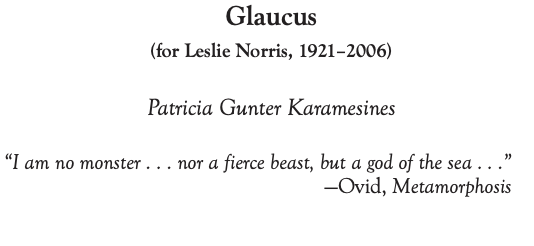Articles/Essays – Volume 41, No. 3
Glaucus
for Leslie Norris, 1921–2006
“I am no monster . . . nor a fierce beast, but a god of the sea . . .”
—Ovid, Metamorphosis
We can’t say what Glaucus knew
From watching storms crush and reshape
The surge, what voices he’d heard
When the tide swelled onto the beach,
Or what he’d seen in fish guts dropped
On sand. He merely husbanded the waves,
Throwing his web over that endless face
Of expression. Not a fisherman
To prowl safe waters for dependable yield,
He went daily before the backward stepping sea.
That’s how he came upon the water meadow
Where no bees dipped the flowers.
The grass had never borne a footstep.
Glaucus was its only creature. He cast
Net offshore, watched it sink away,
And with a few lines running between himself
And some place beyond clear prospect,
Waded through eye-watering glare angling off
The sea’s hooked and changeful scales.
He laid his catch on the old grass,
Saw dead fish shudder, retake life, lift
Themselves upright. Dorsal, caudal fins
Manipulated air as though liquid,
And under his look, they swam overland
Back to the breathable deep.
It’s hard to grasp how Glaucus thought, “The grass.”
Harder still to imagine his eating it.
He must have decided during some untold history
To bid farewell forever, to leave lines and nets
Masterless upon the sand, and the swale
As he found it, at the edge of his gone world.
What should we make of the desire that took him?
We, too, have stood on the shore of the thousand-fold myth,
And still we stand, awaiting science or some parent.
What occurs instead is the muteness of vast event
And the crash of the breakers of mystery.
Thus Glaucus went beyond strands
Of the imagination, god with a raveling green beard,
Hair an undertow in itself, heroic shoulders,
Blue arms, and legs fused, each curving
Down thigh and ankle into a fluke.
But we can’t envy him. If he came to us
We’d spurn him—like Scylla did—as a monstrous innocent,
The changed creature of some obscure devotion.


 Back to full Issue
Back to full Issue

